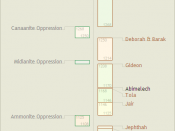The way in which every judge reaches decisions in the courtroom differs depending on many different criteria. These criteria are aspects of their education, training, experience, personality, and their family history. Since all of these can never be the same for any two judges', the question of what makes a great judge should be raised in order to establish a uniform position for a uniform system. A judge's overall attitude and personality will be discussed in accordance to the definitions given by Marvin E. Frankel and the question of whether a judge's humanity is questionable will be discussed in accordance to Jerome Frank's view on the issue. Jerome Frank also offers a number of changes in which judges can be trained and educated that could strengthen the abilities of the judges and, in turn, strengthen the whole system.
A judge's demeanor has much to do with the quality of the judge.
All trial judges should be neutral to all issues, detached from all sides, have great knowledge of the law, be firm but fair, and be knowledgeable about human behavior. Since every trials decision determines the fate of all involved, a judge has a deep responsibility to find the truth no matter how the facts and issues may be clouded. Truth is found, in our case, through the workings of the adversary system of contest. In this system a judge is a guide and decision maker, not just an umpire, he/she must make impartial and detached decisions while also working with the jury to ensure equality between contestants under the law.
It would be an ideal situation to have all judges' follow every principle given in accordance and always find truth and a just decision, but this is not the case. Many judges' make mistakes and can be misled...


